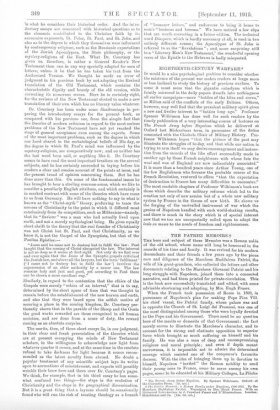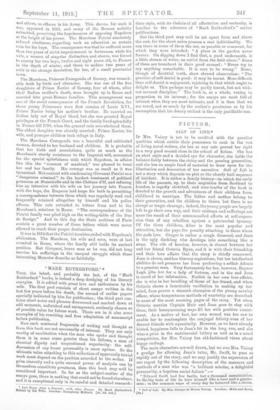THE PATRIZI MEMOIRS.{ THE hero and subject of these Memoirs
was a Roman noble of the old school, whose name will long be honoured in the records of his time and family. It was revived for his modern descendants and their friends a few years ago by the pious care and diligence of the Marchesa Maddalena Patrizi, the wife of his great-grandson, who collected the letters and other documents relating to the Marchese Giovanni Patrizi and his long struggle with Napoleon, joined them into a connected narrative, and had them printed for private circulation. This is the book now successfully translated and edited, with some advisable shortening and adapting, by Mrs. Hugh Fraser.
When the French took possession of Rome in 1808, in pursuance of Napoleon's plan for making Pope Pius VII. his chief vassal, the Patrizi family, whose palace was and is opposite the Church of Sb. Luigi del Francesi, was one of the most distinguished among those who were loyally devoted to the Pope and his Government. There need be no question here of the merits or demerits of that Government : the fact merely serves to illustrate the Marchese's character, and to account for the strong and obstinate opposition to superior force which brought so much suffering on himself and his family. kIe was also a man of deep and uncompromising religious and moral principle ; and even if depth meant narrowness, it is impossible not to admire the determined courage which resisted one of the conqueror's favourite decrees. With the idea of bringing them up in devotion to himself, Napoleon "invited" the Roman nobility to send their young sons to France, some to serve among his own pages, some to be educated at his Military Colleges, La Fleche
• Tho FronolL Army before Napoleon. By Spenser Wilkinson. Oxford: at the Clarendon Press. [6s. net.]
. The Petrie': Meonoire : a Roman Family under Napoleon, 1796.1815. By the Marchese Maddalena Patriot. Translated by Mrs. Hugh Fraser, With an Motorboat Introduction by J. Crawford Fraser and 17 Illustrations. London: Hutchinson and Co, [12s. 6d, not.]
and others, as officers in his Army. This decree, for such it was, appeared in 1811, and many of the Roman nobility submitted, perceiving the hopelessness of opposing Napoleon at the height of his power. The Marchese Patrizi absolutely refused obedience, regarding such an education as certain ruin for his boys. The consequence was that he suffered more than two years of strict imprisonment in fortresses, while his wife, a woman of singular distinction and charm, was forced to convey her two boys, twelve and eight years old, to France in the depth of winter, and there to endure two years of exile in the strange desolation, for her, of a small provincial town.
The Marchese, Princess Cunegonda of Saxony, was remark- able both by birth and character. She was one of the five daughters of Prince Xavier of Saxony, four of whom, after their Italian mother's death, were brought up in Rome and married into great Roman families. This arrangement was one of the social consequences of the French Revolution, for these young Princesses were first cousins of Louis XVI., Prince Xavier being his mother's brother. He married an Italian lady not of Royal blood, but she was granted Royal privileges at the French Court, and the family lived splendidly in France till 1700, when the general ruin overwhelmed them. The eldest daughter was already married: Prince Xavier, his wife, and younger children took refuge in Italy.
The Marchese. Cunegonda was a beautiful and cultivated woman, devoted to her husband and children. It is probable that her birth and associations, quite as much as the Marchese's sturdy resistance to the Imperial will, accounted for the special spitefulness with which Napoleon, in affairs like this the "meanest of mankind," was pleased to treat her and her family. His revenge was as small as it was tyrannical. Not content with condemning Giovanni Patrizi as a " dangerous criminal" to the hardest treatment of political prisoners at Penestrelle and in the Chateau d'If, and refusing him an interview with his wife on her journey into France with the boys, the Emperor laid traps for both in permitting a correspondence between them which was regularly read and frequently retained altogether by himself and his police officers. This rule extended to letters from and to the Marchese's relatives in Rome. " The correspondence of the Patrizi family was piled high on the writing-table of the Duo
de Rovigo." And to this day the State archives of Paris contain a great number a these letters which were never allowed to reach their proper destination.
It was in 1814 that the Patrizi troubles ended with Napoleon's abdication. The Marchese, his wife and sons, wore at last reunited in Rome, where the family still holds its ancient
position. But Giov.anni, brave man as he was, did not long survive his sufferings in the unequal struggle which these interesting Memoirs describe so faithfully.



































 Previous page
Previous page